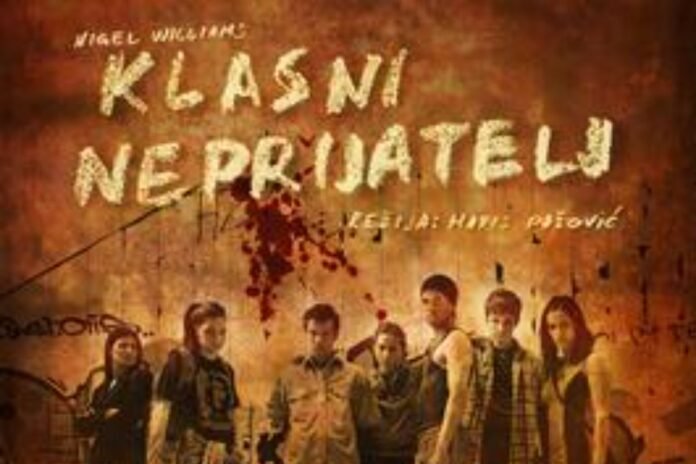“Only Connect.” That was novelist E.M. Forster’s key to humankind finding meaning in our fragile world. Much of art and art making has been borne out of this desire to communicate and to connect.
Class Enemy, a Bosnian and Herzegovinian production, is a lesson in how futile this endeavor can be in a world fractured by war, ethnic violence and sectarian differences.
For more than 100 minutes, the audience is engulfed in a maelstrom of hate and violent physicality – an overwhelming lesson of a world devoid of hope yet with its beast-like denizens yearning and reaching out for any hope even if it is in a mythical caring teacher who is yet to come.
Class Enemy, written in 1978 as a social commentary on the apathy and anarchy in inner city British schools, translates well with the classroom setting turning into a metaphor for the war torn country that was once known as Yugoslavia.
The play begins with 6 students waiting for a teacher and, like Beckett’s Vladimir and Estragon, they wait in vain. What we learn as the play unravels is that no one cares any more, at least for these students, the dregs of class 4K.
The female Deputy Headmistress delivers her scathing assessment, spitting the words with no compassion or understanding, a symbol of the adult world that has no time for the youth because it’s too busy trying to destroy itself.
As they say nature hates a vacuum, and into the break steps Iron, the school yard bully. He commandeers the situation, forcing each student to ‘teach’ a lesson. Here a shout out must go to actor Amar Selimovic, whose portrayal of Iron has that relentless physical brutality that’s compelling yet repulsive.
The world created by director Haris Pasovic and the East West Theater Company is one that’s nihilistic. The set is a bleak classroom with broken tables and chairs, dirty blackboard and lit with sterile fluorescent lamps. Over 12 scenes, reflects a world where language could no longer communicate nuances, reduced to the fractured and profane.
When each character is ‘teaching’ a lesson, whether on sex, pie making, flower boxes, these are moments when the audience are being taught a lesson on how language could no longer support communication. The script subverted the character’s intent to communicate descending to the banal and simplistic. It was a powerful motif for the gulf that has evolved between the desire to communicate and the ability to achieve it. As the three female characters – Sky, Cobra and Chick – teach, they try to share their attempts to transcend their immediate. These attempts are sadly pathetic and feeble. For example, Sky tries to create and assert her identity by painting her name 2 metres high on a school wall as graffiti.
Each cast member displays strong physicality, giving their characters the feeling of nervous pent-up energy of misplaced youth. With so much energy waiting to burst forth and no outlets, the youth implode; bullying, violently flinging furniture and engaging in sexually brutal pas de deux.
This is not the sweetly innocent Breakfast Club or street kids turned good ala Take The Lead. These youth are more like escapees from A Clockwork Orange or Romper Stomper, stripping the human animal of all pretensions of civility, reduced to bestial forms.
The search for significance ended inevitably violently. The denouement was anti-climatic, ending farcically in the death of 3 characters. Prior to this play, this UrbanWire reviewer read Nigel Williams’ play. It ended with Iron’s lesson on self defense ringing ironically (pun intended) in the silence as the lights faded at the close of the play.
In the original, no one died. In contrast, Pasovic’s heavy-handed version ends with a flurry of tragedy.
As the stage lights fades, the remaining characters line up, glaring challengingly at the audience. Was this an attempt to break the ‘fourth wall’ and include them into the diatribe against humanity? If it was, it was too late; it was an ending that definitely didn’t work.
After more than 100 minutes of non-stop onslaught of action and unmitigated anger, this UrbanWire reviewer was numbed. This production didn’t allow moments for the audience to breathe, to contemplate and to take in the events. There were too few nuanced moments.
UrbanWire wants to see some depth to the acting, which was overall competent and occasionally transcendent. The characterizations that this reviewer found compelling were those by Maja Izetbegovic (Sky), Nusmir Muharemovic (Kid) and Cobra (Maja Zeco). Their characters grew and evolved before our eyes. Kitty (Samir Karic) and Cat (Amir Muminovic) were token rappers and were fodder for Iron’s bullyboy, while the cutesy Kitty + Cat was a little twee.
Class Enemy is nevertheless a powerful piece of political commentary. When Kid blames the Serbs for his situation, he reflects the same prejudices and simplistic interpretations that many are guilty of. His ethnicity is quietly, simply signaled with the use of a prayer cap. When he accidently kills Sky, we are presented with the theatrical metaphor for the meaningless devastation that Saravejo is trying to come to terms with.
As the lights fade, with the tables and chairs staked as a barricade and the students in a defensive stance, one wonders where the danger is – outside or in. Only connect – only a faded memory. After all, the homo sapien is the only animal that wars against its own.
Photo courtesy of Zijah Gafi
Contributor bio: Lucilla Teoh graduated from NUS (BA Hons in English), MFA, looking into educational theatre and intercultural, inter-disciplinary forms from QUT. She was the BA Coordinator for La Salle SIA College of the Arts Drama Department and the PR Manager with TheatreWorks. With TheatreWorks, she has worked in different capacities as production-stage manager and on education programmes. She also freelanced as a journalist.
This article is part of UrbanWire’s 9-week Singapore Arts Festival 2008 special. Get all the latest Arts Fest updates and reviews on UrbanWire.

